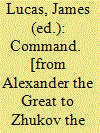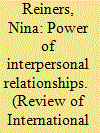| Srl | Item |
| 1 |
ID:
140792


|
|
|
|
|
| Edition |
1st ed.
|
| Publication |
London, Bloomsbury Publishing Ltd., 1988.
|
| Description |
255p.hbk
|
| Standard Number |
0747502250
|
|
|
|
|
|
|
|
|
|
|
|
Copies: C:1/I:0,R:0,Q:0
Circulation
| Accession# | Call# | Current Location | Status | Policy | Location |
| 030632 | 923.5/LUC 030632 | Main | On Shelf | General | |
|
|
|
|
| 2 |
ID:
169257


|
|
|
|
|
| Summary/Abstract |
Religious knowledge is at the heart of the Shiʿi system of clerical authority known as the marjaʿiyya. Given the multiplicity of more or less well-established claimants to the position, this article explores the scholarly credentials of the contemporary marjaʿ[source of emulation; pl. marājiʿ]. I conceptualize the marjaʿiyya in accordance with Pierre Bourdieu’s notion of the field in order to examine how scholarly capital is defined, and possibly redefined, by 14 religious scholars competing in this marjaʿiyya field in Iraq. To do so, I use their ‘official’ biographies in Arabic and analyze the types of credentials of scholarly capital that are put forth to legitimate the claims of these marājiʿ. I argue that, despite the multiplicity and diversity of contenders, there is a fair degree of homogeneity in the ways scholarly capital is defined. In the biographies, the marājiʿ’s scholarly capital is validated against three broad indicators: their inherited scholarly capital, which stems from their family background; their educational capital; and the intellectual-scientific prestige capital derived from their scholarly and teaching activities. The credentials emphasized in the different biographies are generally much alike, and if a marjaʿ does not satisfy them, ‘almost-like’ credentials are constructed. Abidance to shared codes and practices reflects, as well as contributes to, the stability of the marjaʿiyya field.
|
|
|
|
|
|
|
|
|
|
|
|
|
|
|
|
| 3 |
ID:
193479


|
|
|
|
|
| Summary/Abstract |
This article further develops and illustrates the argument that relationships between individuals help to explain the success of human rights advocacy in international institutions. Drawing from advocacy theory and socio-legal studies, I shift the attention from collective forms of advocacy to the importance of interpersonal relationships of advocates with individuals in international institutions to influence the development of human rights. I introduce a framework consisting of three analytical steps – mapping the key actors in a network, process-tracing, and biographical research – and apply the framework to three cases of norm development by a United Nations human rights treaty body. My findings highlight the power of interpersonal relationships for the making of human rights, and they inform scholarship on transnational elites, human rights advocacy, and the politics of international law.
|
|
|
|
|
|
|
|
|
|
|
|
|
|
|
|